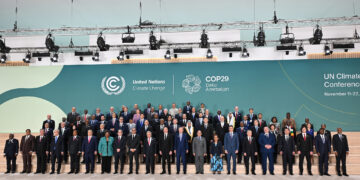The European Commission has released its evaluation of the draft National Energy and Climate Plans (NECPs) submitted by EU Member States, along with recommendations to help them align with the 2030 EU targets. While the updated NECPs show progress toward meeting the 2030 goals, the Commission emphasizes the need for additional efforts, especially in light of the COP28 outcomes and the global push to accelerate climate action this decade.
In its detailed analysis of 21 timely-submitted NECPs, the Commission calls on Member States to intensify their focus on reducing greenhouse gas (GHG) emissions, provide clearer plans for climate adaptation, and enhance efforts in renewable energy uptake and energy efficiency. The assessment reveals that the current draft NECPs fall short of achieving a 55% reduction in GHG emissions by 2030, with current measures projecting a 51% reduction. To close this gap, the Commission recommends a 6.2% increase in efforts within the effort-sharing sectors.
Furthermore, the NECPs indicate a gap of -40 to -50 MtCO2eq compared to the -310 MtCO2eq target under the LULUCF Regulation, emphasizing the need to enhance the carbon sink. For renewable energy, the drafts project a share of 38.6-39.3% by 2030, falling short of the 42.5% target. Similarly, energy efficiency improvements are projected at 5.8%, compared to the 11.7% target.
The Commission underscores the urgency of phasing out fossil fuels, particularly solid fossil fuels, and highlights the hindrance posed by persisting fossil fuel subsidies. The Commission recommends redirecting subsidies away from non-energy poverty or just transition-related purposes toward innovation and support for vulnerable groups.
Member States are also urged to prioritize energy security, boost the competitiveness of clean energy value chains, and plan for a diversified, competitive energy supply in their final NECPs. Clarity and predictability for businesses and investors, along with planning for the use of public funds, are crucial aspects emphasized by the Commission. Additionally, attention to reskilling, upskilling, and social impacts is recommended to ensure an inclusive and just green transition.
In conclusion, the Commission stresses the necessity of significant additional measures to adapt to climate change and enhance resilience in the energy system. Final NECPs are expected to adequately address climate-related impacts, align with the Union’s climate-neutrality objective, and make progress on adaptation, as outlined in the European Climate Law.





